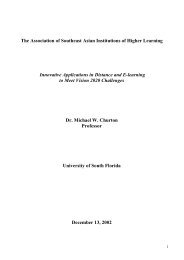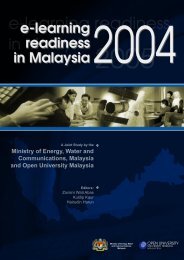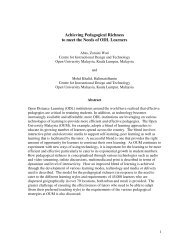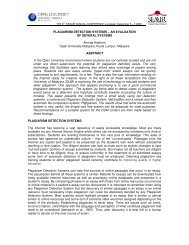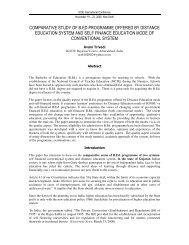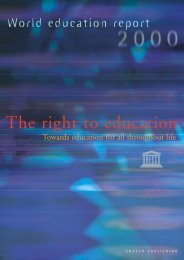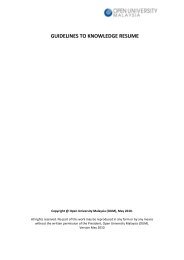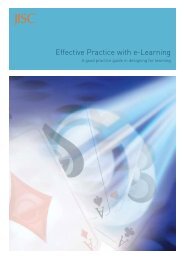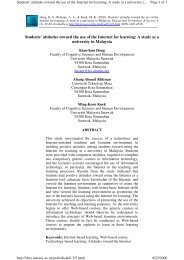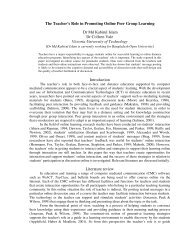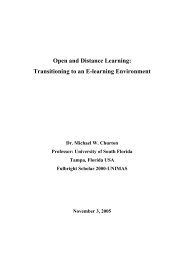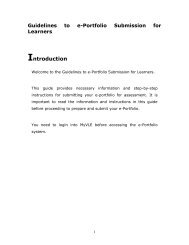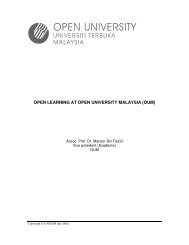lifelong learning and distance higher education - Asia Pacific Region
lifelong learning and distance higher education - Asia Pacific Region
lifelong learning and distance higher education - Asia Pacific Region
- No tags were found...
Create successful ePaper yourself
Turn your PDF publications into a flip-book with our unique Google optimized e-Paper software.
<strong>higher</strong> <strong>education</strong>, including virtual <strong>education</strong>. The third aim was to capitalise on ICTfor effective, user-friendly advisory, guidance, <strong>learning</strong> material, administrative <strong>and</strong><strong>education</strong>al services.The plan is in line with the Bologna Declaration of 19 June, 1999, a joint declarationof the European ministers of <strong>education</strong>, which aims at establishing a European area of<strong>higher</strong> <strong>education</strong> by 2010. The process is co-ordinated by the Bologna Follow-up Group(www.bologna-bergen2005.no/). This area is intended to promote the mobility of people,the transparency <strong>and</strong> recognition of qualifications, the quality <strong>and</strong> European dimension of<strong>higher</strong> <strong>education</strong>, <strong>and</strong> the attractiveness of European institutions to third country students.The FVU is one means of facilitating virtual mobility. Finl<strong>and</strong> has ratified the Conventionon Recognition of Qualifications concerning Higher Education in the European <strong>Region</strong>,drawn up by the Council of Europe <strong>and</strong> UNESCO in April 1997.Organisation <strong>and</strong> funding of the Finnish Virtual UniversityThe Finnish Virtual University (FVU) is a consortium of all the Finnish universities.In addition to the 20 universities in the Ministry of Education sector, the Consortiumincludes the National Defence College, administered by the Ministry of Defence. TheConsortium Agreement was signed on 18 January, 2001.The decision-making body in the FVU is the Consortium Assembly, which is composedof one representative from each member university <strong>and</strong> one from the Ministry ofEducation. The universities are mostly represented by rectors or vice rectors. TheConsortium has one or two meetings per year. The agendas are drawn up by the FVUSteering Group, which also exercises authority between meetings. The Steering Groupcomprises five members nominated by the Consortium Assembly, one nominated by theMinistry of Education, <strong>and</strong> the director of the FVU Service Unit. There are also expertmembers, including representatives of Centre for Scientific Computing, the NationalUnion of Students in Finl<strong>and</strong> <strong>and</strong> the National Electronic Library. Besides participating innational collaboration, each member university has a special unit to promote <strong>and</strong> supportonline <strong>learning</strong> <strong>and</strong> teaching locally.The financing allocated by the Ministry of Education to universities during the three-yearagreement period provides the actual core funding, which amounts to some 87 per cent ofthe operational expenditure. The remaining 13 per cent constitutes financing of nationaltasks <strong>and</strong> programmes. The national programmes covering several years, initiated by theMinistry of Education, derive from the government programme, the Development Planfor Education <strong>and</strong> Research or the Ministry’s own resolutions. The Virtual University isone of the national priority programmes in the period 2000-2006.The funding of Virtual University activities is determined in the performance agreementsseparately concluded between the Ministry of Education <strong>and</strong> each university. TheMinistry of Education has financed virtual university projects since 2001, when the totalannual volume of the funding was €8.4 million. In 2005, the total is €9 million. Half ofthe funding is given to universities in proportion to their size for virtual teaching projectsprioritised by each university <strong>and</strong> for staff-development training. The other half is givento the Virtual University networks.Operational ideaThe operational idea of the Finnish Virtual University is that the universities provideservices that enable students to find flexible ways to study <strong>and</strong> help the university staff110



